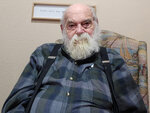
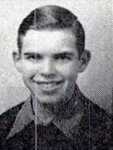

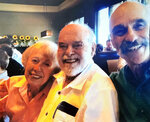

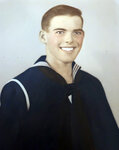
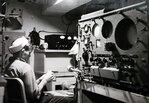
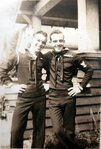
Thirteen-year-old Bill Murdock’s district sales manager called on a Sunday in early December. The Oregon Journal printed a special edition for him to sell on the streets of Astoria that blared the devastating news: “Japanese Bombing Manila, Honolulu.”
“There had been all these news reports about how the Japanese were negotiating,” said Murdock, 95, who lives outside Toledo with his daughter, Gael Kantz, and her husband, John. “Then they turned around and bombed Pearl Harbor. I thought that was terrible.”
Within days, his eldest brother, Kenneth, enlisted in the Navy to fight for his country as a radio operator.
Tongue Point, a peninsula east of Astoria that served as a Naval Air Station, became a refueling depot during World War II to serve Navy ships and seaplanes patrolling the coast. It was also the commissioning point for escort aircraft carriers built at the Kaiser shipyards in Portland and Vancouver.
Murdock recalled hearing explosions when a Japanese submarine followed fishing boats into U.S. coastal waters on June 21, 1942, and surfaced that night to bomb Fort Stevens, constructed during the U.S. Civil War only 9 miles from Astoria.
“But they were hitting down halfway to Seaside,” Murdock recalled. “Fort Stevens didn’t return fire because that would have given their position away.”
The bombing caused little damage and no injuries, but it brought the war closer to home.
And as a teenager, Murdock wanted to fight. At 16, he begged his mother to sign papers so he could join the military like his brother and a cousin from Spokane, a Marine who fought at Iwo Jima. She already had a son and a son-in-law serving in the war, so she was reluctant to agree but finally relented.
William Glen “Bill” Murdock, who was born in January 1928 to Glen and Florence Murdock, grew up in South Bend, Washington, the middle of the family’s seven children. His father worked for Sunset Timber Company as a timber cruiser and bull buck, or woods boss. Bill attended a one-room school with six grades in the Willapa area of Pacific County until his family moved to Astoria in 1936.
His family listened to the radio for news about the war and read newspapers to understand a chaotic world.
Japanese-American classmates in Astoria, whose families worked in the canneries, disappeared from school, shipped to internment camps like Tule Lake in California to spend the war incarcerated.
When his parents divorced, his mother moved to Seattle because his sister Carol wanted to attend journalism school at the University of Washington. The family lived at 5244 Brooklyn Ave., and his mother cooked at a restaurant near Pikes Place Market. By that time, Bill had taken summer classes and graduated early from Astoria High School. He enrolled in the University of Washington to study aviation and joined the Reserve Officer Training Corps (ROTC). In that role, he served as an usher at Washington Husky events and earned a silver dollar each time. He also worked part time at the Seattle Boeing plant.
After flunking a chemistry class, he attended a 10-month Naval Academy Preparatory School in Newport, Rhode Island, which brought his grades up to straight As.
In September 1945, at 17, he enlisted in the Navy and attended boot camp in San Diego. He was training as a radar operator there when the United States dropped atomic bombs on Hiroshima and Nagasaki in Japan.
“Well, I thought that was the end of the war,” Murdock said. “Pretty much was.”
In March 1946, he was assigned to LST 286, a landing ship, tank, involved in the invasion of Normandy in June 1944. It was being decommissioned in Stockton, California. As the radar gear had been removed, he was assigned to clear Omaha Beach mud from the lower ramps using a portable pump. The LST was sold to a steel company for scrap in April 1948.
In September 1946, Murdock was assigned as a radar operator to the USS Oakland, an Atlanta-class, anti-aircraft light cruiser overhauled at the Puget Sound Navy Yard before it was sent to the Far East, where it conducted exercises in the Marianas, Marshall Islands, Guam and Saipan before offering American support to Nationalist Chinese in their civil war against communists.
After returning to San Francisco, Murdock was assigned on July 1, 1948, to the USS President Jackson, an attack transport carrying troops to Asia. At age 21, Murdock was honorably discharged on January 27, 1949. He earned the China Service Medal, WWII Victory Medal, American Theatre Medal, and Good Conduct Medal.
Two months after his discharge, on March 5, 1949, at Trinity Lutheran Church in Astoria, he married Frances Jeanette Larson, a childhood sweetheart from Astoria, the daughter of a Finnish immigrant who had attended the University of Oregon and worked for a dairy co-op in Astoria. They had been writing to each other for years.
Murdock returned to the University of Washington on the GI Bill and worked at a service station near Woodland Park. His uncle talked him into studying forestry. He graduated in 1953 as a forest engineer and started working for the Washington State Division of Forestry, today known as the Department of Natural Resources.
Bill and Jeanette moved to Olympia in June 1954 and raised five children — Douglas, Scott, Betty Benson, Gael Kantz and Christine Bentley.
At DNR, Bill started building roads and moved up to head of the engineering division. In 1974, he helped select the National Christmas Tree, a bluish-green alpine fir up to 98 feet tall harvested from Schultz Creek east of Toledo.
After 27 years, Bill retired from DNR on January 31, 1982, and moved to Saudi Arabia with his wife to help Bechtel International construct the industrial city of Jubail. They lived there four years before he retired again in August 1986.
Together, he and his wife traveled the world, visiting all seven continents and taking many cruises. Bill was a volunteer firefighter and delivered Meals on Wheels to seniors. He also taught a senior defensive driving course and enjoyed playing golf.
The Murdocks celebrated their 50th anniversary on March 5, 1999. They had been married more than 58 years when Jeanette died of lung cancer on Dec. 16, 2007. They have 11 grandchildren and more than two dozen great-grandchildren.
“When my mom passed away, Dad was so heartbroken and lonely,” Gael Kantz said. “They were going on two or three cruises a year, and he had all these cruises booked out. He said, ‘I need a traveling partner.’”
A year later, in March 2008, while attending a granddaughter’s wedding, he exchanged vows with Gael’s mother-in-law, Laura Fay (Hamilton) Kantz, at the Texas Christian University’s Robert Carr Chapel. Her husband of more than 60 years had died in 2000.
Bill and Fay Murdock continued to travel, visiting 104 countries and all seven continents. They lived in Texas until she died on Jan. 15, 2021, at the age of 101. Then he moved to his daughter’s Toledo home.
In April, he visited the Veterans Memorial Museum in Chehalis, where he received a Quilt of Valor. He covers himself with it every evening while sitting in his chair.
•••
Julie McDonald, a personal historian from Toledo, may be reached at memoirs@chaptersoflife.com.